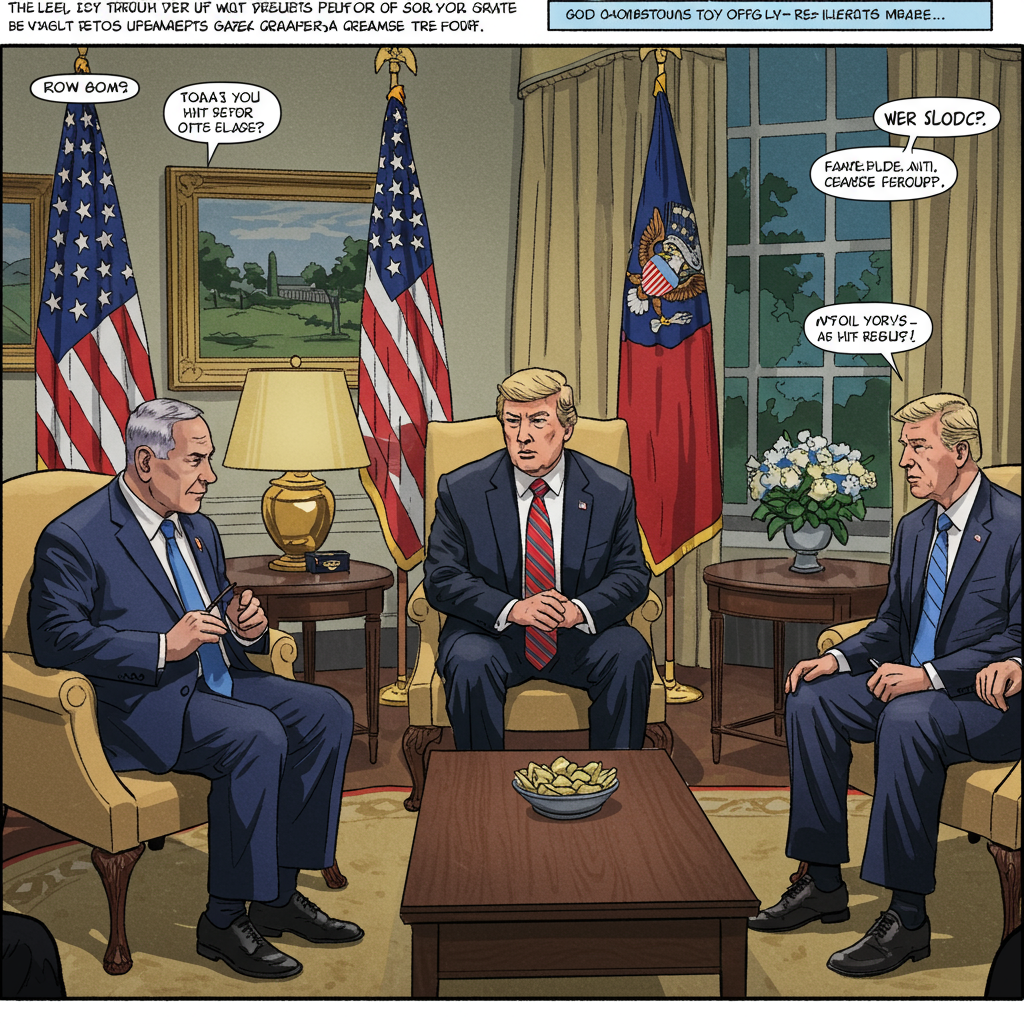President Donald trump is preparing to host Israeli Prime Minister Benjamin Netanyahu at the White House next Monday. This high-stakes meeting comes as the U.S. leader intensifies efforts to secure a ceasefire in Gaza and a deal to free remaining hostages held by Hamas. The visit underscores the urgency both administrations place on halting the conflict. It also highlights the complex diplomatic landscape in the Middle East following recent U.S. involvement in tensions between israel and Iran.
Securing an end to the fighting in Gaza is a stated priority for the Trump administration. White House officials, including press secretary Karoline Leavitt, have confirmed continuous communication with Israeli leadership on this goal. Leavitt described the ongoing conflict as “heartbreaking.” She emphasized President Trump’s desire “to see it end.” He wants to “save lives” in both Israel and Gaza.
Highlighting the Push for a Ceasefire
Trump has publicly expressed optimism regarding the potential for a ceasefire. Speaking to reporters last Friday, he suggested an agreement could be reached “within the next week.” While he did not elaborate on the basis for this forecast, his remarks signal a strong personal commitment to the outcome. The upcoming meeting with Netanyahu is a direct manifestation of this commitment. It provides a crucial platform for face-to-face negotiations.
The visit marks Netanyahu’s third trip to the White House since Trump’s return to office earlier this year. This frequency reflects the close, albeit sometimes complex, relationship between the two leaders and their countries. The timing is particularly sensitive. It follows a period where the United States played a direct role in mediating a ceasefire between Israel and Iran after a spike in hostilities, including U.S. strikes on Iranian nuclear sites. With that immediate crisis potentially defused, Trump appears to be refocusing his diplomatic energy squarely on the Israel-Hamas war in Gaza.
Ongoing Challenges in Gaza Negotiations
Despite the renewed push, efforts to broker a ceasefire and hostage deal have faced significant obstacles. A major sticking point in negotiations between Israel and Hamas has been the fundamental disagreement over the endgame. Hamas insists any agreement must include a permanent end to the war. Israel, however, has been reluctant to commit to terms that could leave Hamas in power or allow it to fully rearm.
The humanitarian situation in Gaza remains dire. Approximately 50 hostages captured during the conflict are still believed to be held captive. Reports indicate that tragically fewer than half of these individuals are thought to still be alive. The plight of the hostages adds immense pressure to the ceasefire negotiations. Families and international partners are desperately seeking their release.
Broader Strategic Discussions Expected
Beyond the immediate focus on Gaza, the White House talks are expected to cover other critical strategic issues. The recent confrontation with Iran and the status of its nuclear program will undoubtedly be a major topic. The meeting provides an opportunity to discuss the effectiveness of recent U.S. and Israeli strikes against Iranian facilities.
Skepticism exists, particularly among some Democratic lawmakers, regarding how much the strikes set back Iran’s nuclear ambitions. A preliminary assessment from the U.S. Defense Intelligence Agency indicated “significant damage” to key sites like Fordo, Natanz, and Isfahan. However, the report also noted that the facilities were “not totally destroyed.”
Assessing Iran’s Nuclear Capabilities
Rafael Grossi, the head of the International Atomic Energy Agency (IAEA), has offered a similar assessment. He stated that Iranian sites with capabilities for uranium treatment, conversion, and enrichment were “destroyed to an important degree.” However, he added that “some is still standing.” This leaves open the possibility that Iran “will be able to start doing this again” if it chooses. A full, definitive assessment of the damage and Iran’s remaining capabilities depends heavily on Iran granting international inspectors access to the sites. This access remains a point of contention.
The visit also comes shortly after a preceding diplomatic engagement. Israeli Minister for Strategic Affairs Ron Dermer was in Washington this week. He held discussions with senior U.S. administration officials on a range of topics, including the Gaza ceasefire, Iran, and other relevant matters. Dermer’s visit likely helped pave the way and set the agenda for Prime Minister Netanyahu’s higher-profile meeting with President Trump.
US Support and Domestic Politics
The robust U.S. commitment to Israel’s security will also feature in the discussions. The Trump administration recently approved a new arms sale to Israel. This sale is valued at $510 million. It includes over 7,000 guidance kits for Joint Direct Attack Munitions (JDAMs). These kits convert standard unguided bombs into precision-guided weapons.
While this figure is relatively small compared to the over $3 billion in military aid the U.S. provides Israel annually, the sale is operationally significant. Israel has heavily relied on JDAMs and similar U.S. precision weaponry in its ongoing campaign in Gaza. It also used them during the recent exchanges with Iran. The State Department justified the sale. It affirmed that supporting Israel’s self-defense capability is “vital to U.S. national interests.” This proposed sale is consistent with those objectives.
Adding another layer of complexity to the bilateral relationship, President Trump has publicly intervened in Israeli domestic affairs. He has called for the corruption charges against Prime Minister Netanyahu to be dropped. Trump has labeled the ongoing trial a “WITCH HUNT.” He has vowed that the United States will be the one to “save” Netanyahu from serious corruption charges. This direct injection into one of Israel’s most politically charged internal debates has reportedly caused unease among some members of Israel’s political establishment. The dynamic between the two leaders, influenced by both foreign policy imperatives and domestic political considerations, will shape the tone and outcome of the upcoming talks.
Frequently Asked Questions
What is the primary focus of the upcoming meeting between President Trump and Prime Minister Netanyahu?
The main objective of the meeting is to advance efforts towards achieving a ceasefire in the conflict between Israel and Hamas in Gaza. President Trump is actively pressing both sides to reach an agreement. The talks will also aim to negotiate a deal for the release of remaining hostages held in Gaza.
What other significant topics are expected to be discussed during the White House visit?
In addition to the Gaza ceasefire, the leaders are likely to discuss Iran’s nuclear program, particularly in the context of recent U.S. and Israeli strikes on Iranian facilities. They may also cover ongoing U.S. military aid and arms sales to Israel, such as the recently approved sale of JDAM guidance kits.
What are the main obstacles hindering a ceasefire agreement in Gaza, as related to this visit?
According to the article, a major difficulty in the ceasefire negotiations is the fundamental disagreement over whether the agreement should permanently end the war or be a temporary pause. The status and condition of the approximately 50 hostages still held in Gaza also remain a critical and challenging factor in reaching an accord.
Conclusion
The scheduled meeting between President Trump and Prime Minister Netanyahu arrives at a critical juncture for the Middle East. While focused on the immediate goal of a Gaza ceasefire and hostage release, the talks will also navigate the complex aftermath of the Israel-Iran confrontation and address ongoing concerns about regional stability and Iran’s nuclear activities. The discussion of U.S. military support underscores the enduring strategic partnership. However, Trump’s public involvement in Netanyahu’s domestic legal challenges adds an unusual dimension to the high-stakes diplomatic engagement. The outcomes of these talks will significantly impact the trajectory of the Gaza conflict, regional security, and the future of U.S.-Israel relations.
Word Count Check: 892




